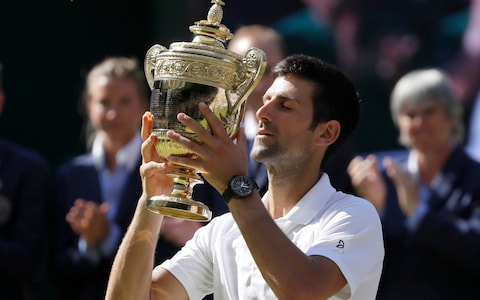Novak Djokovic earned his first Grand Slam title in more than two years by beating Kevin Anderson to win his fourth Wimbledon championship.
Djokovic, seeded 12th, won 6-2 6-2 7-6 (7-3) to claim a 13th Slam – his first major since the 2016 French Open.
The Serb, 31, quickly took control to win the opening set in 29 minutes, breaking twice more in the second set.
Djokovic saw off five set points in an even third set, dominating the tie-break to seal victory.
He dropped to his haunches just inside the baseline as Centre rose to acclaim the champion, hugging South African Anderson at the net before skipping over towards his box and celebrating wildly in front of his coaching team and wife, Jelena.
“I had many moments of doubt, I didn’t know if could come back to this level to compete,” Djokovic said.
“There is no better place to make a comeback, it’s a sacred place for world of tennis, it’s very special.”
He moves into outright fourth place on the all-time list of Grand Slam men’s singles titles, moving clear of Roy Emerson and closing the gap on Roger Federer (20), Rafael Nadal (17) and Pete Sampras (14).
The former world number one will move back into the top 10 when the latest rankings are released on Monday.
Djokovic back to his Slam-winning best
Djokovic dominated the men’s game earlier this decade, holding the number one ranking for 223 weeks and completing a career Grand Slam when he claimed the title at Roland Garros two years ago.
Then, his cloak of invincibility began to slip.
After losing to Sam Querrey in the third round of Wimbledon in 2016, Djokovic alluded to difficulties in his personal life and his form subsequently tailed off.
Fitness also became an issue, taking two spells away from the ATP Tour because of an elbow injury, leading to him dropping out of the world’s top 20 earlier this year for the first time since 2006.
Now he is back among the world’s elite after a wonderful Wimbledon.
Inspired to play tennis?
Djokovic broke serve twice in each of the opening two sets, dismantling 6ft 8in Anderson’s service game and grinding him down in the rallies.
Anderson rarely ventured forward and offered little variation – until the third set at least – but Djokovic nullified the increased threat to win in two hours and 18 minutes.
Slow start for Anderson after marathon match
While Djokovic’s troubles have been well documented, eighth seed Anderson has enjoyed his own renaissance in the past 12 months.
The 32-year-old cracked the world’s top 10 for the first time towards the end of 2015, but faced a catalogue of injury problems during 2016 and dropped towards the foot of the top 100 as a result.
However, he has battled back to reach two Grand Slam finals and a top-five ranking over the past 18 months.
While reaching last year’s US Open final success showed he possesses an all-round game, Anderson’s biggest weapon remains his serve – which he lost in the opening game against Djokovic with a double fault on break point.
Anderson struggled to find his rhythm and movement in a slow start, unsurprising after spending almost 11 hours on court in his previous two matches, and lost serve again in the fifth game.
While Roger Federer and John Isner eventually succumbed in those marathon quarter-final and semi-final matches, Djokovic was always going to be a tougher opponent to crack with the Serb regarded by many as the best returner in the game’s history.
Of course, Djokovic also had a lengthy semi-final against Rafael Nadal but he did not look like he had returned to Centre Court without the benefit of a day off.
After taking the opener, Djokovic continued to wear down Anderson and, helped by some unforced errors from the South African’s racquet, broke again in the first game of the second set.
Djokovic moved 4-1 ahead before Anderson finally started to ask questions of Djokovic’s serve, missing his first break point in what proved to be the final game of the second set.
-BBC SPORT

